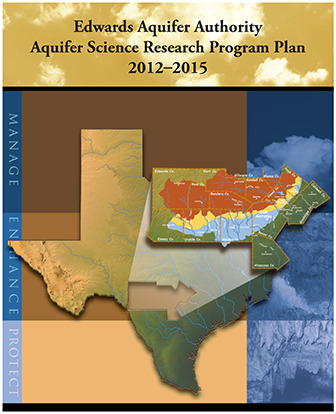Edwards Aquifer Authority Aquifer Science Research Program Plan 2012-2015

| Summary |
|
Purpose of the Aquifer Science Research Program Plan The purpose of this Aquifer Science Research Program Plan (ASRPP) is to provide a strategic planning document to direct EAA aquifer research. The ASRPP is developed and implemented by the Aquifer Science Program staff to gain a better understanding of the properties of the Edwards Aquifer. The ASRPP is updated every two to three years and relies on input from EAA staff, the Aquifer Science Advisory Panel (ASAP), and the Technical Advisory Group (TAG), with final approval of all projects provided by the EAA Board of Directors. The ASAP is an outside panel of experts with extensive credentials in the groundwater sciences. The TAG is composed of representatives for local and regional private and public entities with an interest in the Edwards Aquifer. Goals and Objectives of the ASRPP This document is intended to serve as guidance to the EAA for aquifer research. The goal of the ASRPP is to outline the research needed to provide the best available technical information to policy decision makers as efficiently as possible. Although a substantial body of knowledge exists regarding the hydrogeology of the Edwards Aquifer, many unknowns remain with respect to the aquifer’s properties and characteristics. Continued data collection and research must concentrate on supplementing, refining, and improving aquifer knowledge to provide policy makers with adequate information to make decisions that assist in implementation of the EAA Act. Using the current knowledge base derived from existing research and data, the EAA is poised to make further advances in groundwater and surface water modeling, flowpath understanding, recharge methodology, water quality vulnerability, and data collection. Research Initiatives Since beginning operations in 1996, the EAA has expanded its data collection and research programs to facilitate a growing body of knowledge of the Edwards Aquifer. The growth in expertise of Aquifer Science staff has allowed the EAA to internalize many of its research initiatives to provide cost savings and greater control over research projects. These projects have included tracer testing, water quality sampling, borehole geophysical logging, passive water quality sampling, and groundwater modeling. In addition, the EAA continues to develop partnerships with numerous public agencies and private entities to further the research capacity of the organization. Research recommendations have been developed through consultation with EAA staff, the EAA Board of Directors, the ASAP, and the TAG. Proposed projects for 2012 through 2015 (Table 1) are intended to address recommendations from completed studies, continue existing studies (i.e., support projects), or provide information aimed at addressing basic research needs (see Appendix A for detailed descriptions of proposed active projects). Table 1 also provides a rough order of magnitude (ROM) cost for each proposed project. ROM costs—estimates in current dollars—represent approximate costs. The project listing is subject to modification annually, depending on budgetary limitations, time constraints, or development of new directives (Table 2). Although calendar year 2012 projects were programmed into the EAA annual budget, EAA staff will continue to seek joint funding opportunities for these and other projects. Studies proposed for initiation in calendar years 2013, 2014, and 2015, but not yet under way, are summarized in Table 1, along with a list of the currently anticipated project needs for calendar years 2013 through 2015. As further research and planning takes place, studies will be added and amended for years beyond 2015 so as to accommodate “unknowns” or new developments at the EAA, as well as improvements in technology. |
Search for Documents
Advance Search
Explore EAA's Scientific Reports
- All Reports
- RZ Protection
- Aquifer Levels
- Remote Sensing
- Precipitation
- Overview Studies
- Modeling
- Hydrology and Hydrogeology
- History
- Groundwater Recharge, Recharge Zone
- Groundwater Movement
- Geomorphology and Caves
- Weather Modification
- Geology
- Water Use and Conservation
- Geochemistry
- Water Resources Planning and Management
- Floods and Drought
- Water Quality
- Climatology
- Surface Water / Groundwater Relationship
- Biology
- Springs, Groundwater Discharge
- Archaeology
